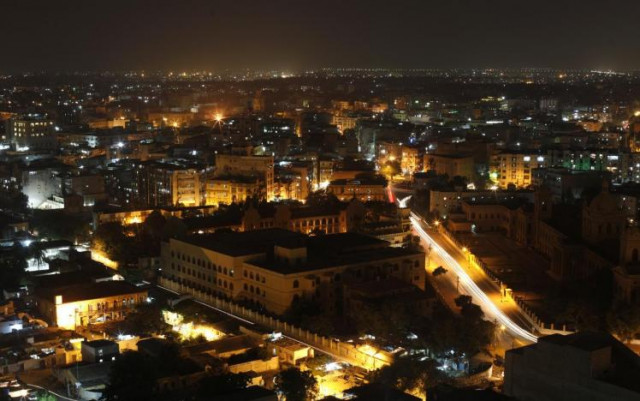Time is running out but no one is paying attention
Pakistan’s reforms process never got completed, focus is on winning elections

View of city skyline at dusk in Karachi. PHOTO: REUTERS
This infamous deficit financing, commonly known as the printing of notes without equivalent to gold reserves, took place worth Rs900 billion last year. The year 2017-18 is said to be witnessing deficit financing close to Rs1,500 billion by the central bank. This is in addition to reckless borrowing being made by the government both from the State Bank of Pakistan (SBP) and commercial banks.
Ever since Pakistan completed its three years $6.67 billion Extended Fund Facility (EFF) programme in October 2016, the IMF officials stopped taking any notice of immense deficit financing which was earlier taking place marginally.
Muddled World Bank report: Pakistan ‘needs’ $31b this year to stay afloat
The current 6 percent inflation rate, insiders maintain, will end up at 10-11 percent by June 30 next year and that if the government did not stop seeking more and more deficit financing the rate of inflation could go up to 15-20 percent reminding us of 2008-2009 when it reached at 25 percent.
There is a general view that in the absence of any authority to be exercised by the officials of ministry of finance, those sitting in the Prime Minister’s Secretariat, are exerting pressure on the central bank to fulfil their funding requirements by resorting to deficit financing.
This is a double edged sword that is bringing more financial difficulties for the hapless and helpless people of Pakistan.
They are facing snowballing inflation due to deficit financing, government’s enormous spending on development activities and latest through Rs5.50 increase in high speed diesel (HSD) prices. The standard tax rate for HSD had always been up to 17 percent and its current increase is over 21 percent.
This Rs5.50 increase in HSD was the highest in last nine months and simply shows that the government is bent upon managing resources from all sides with a view to winning the elections. Generally, it is said that tax rate for petroleum products needs to be reduced but on the contrary it is being revised upward the prime suffer of which is a common man.
Receivables of Pakistan State Oil (PSO) have grown to Rs1,225 billion due to which the organisation is unable to import furnace oil causing 8-12 hours of load-shedding. The government, it is alleged, is wrongly attributing fresh long hours load-shedding to ongoing smog and smoke which is actually happening because of shutting down of many power plants as they were not having adequate supply of furnace oil.
The matter is worsening as the central bank is politely refusing to extend foreign exchange to import what it believes unnecessary furnace oil. Infighting among WAPDA, GENCOs, NTDC, DISCOs and other power companies of the public and private sectors does not go well in terms of resolving power sectors problems.
On one hand there are Rs1,225 billion receivables of PSO and on the other hand there is Rs800 billion circular debt which previously was Rs480 billion and was subsequently paid off by the government immediately after coming into power in 2013. Its kitty position improved when the late King Abdullah of Saudi Arabia generously offered $1.5 billion precious gift to Pakistan.
And if the government goes for devaluation of the rupee, this inflation will further increase and who knows how people will cope with the situation. Already key economic indicators including fiscal and trade deficits, current account deficit, imports, exports, manufacturing, home remittances and foreign exchange reserves are performing negatively as a result of which much needed macroeconomic stability is becoming a distant dream.
Dar steps in to end tiff on economy
Independent economists believe that it all started with the announcement of the current budget in which the development strategy has been changed aimed at winning the next election by dolling out Rs250 billion to PML-N MNAs and MPAs. It was termed a “political programme” that witnessed a big 25 percent increase in the Public Sector Development Programme (PSDP), up from Rs700 billion to over Rs1,000 billion in 2017-18.
Moreover, the government sadly allocated just Rs7 billion for the power sector in the PSDP of the current financial year. Since the country’s transmission lines are speedily decaying, the government was expected to allocate some handsome funding for their early rehabilitation. But it did not happen, prompting critics to ask how can the expected 10,000MW to 12,000MW of new electricity be managed in the presence of weak and old transmission lines?
The flawed development strategy worked out for the current budget is said to have caused problems at all levels and increasing political uncertainty has made matters worse.
The irony is that while new power plants continue to be installed and commissioned, no new planning was done to replace the existing crumbling transmission lines that are said to be warranting billions of rupees.
The pending structural reforms especially in the energy and revenue sectors remained the number one problem that could not be partially addressed. The Fund officials just paid lip service to these reforms.
But in reality they kept extending waiver after waiver and did not press the government to implement structural reforms in key sectors like revenue and energy. The government received 15 unprecedented waivers during all the 12 reviews of the economy by the IMF.
It was said to be a political and not an economic programme which was initiated at the behest of the US State Department which did not want any instability in the region.
The situation, nonetheless is different today as the US government seems unprepared to use its over 70 percent voting right in the World Bank and IMF to bail out Pakistan.
The failure in implementing structural reforms in the revenue sector is becoming a main hurdle to generate adequate revenues in order to have a double digit tax-to-GDP ratio. There is Rs200-250 billion annual revenue shortfall that continues to be faced by the government.
This shortfall cannot be avoided unless the tax policy division and revenue division is bifurcated without which an improved tax-to-GDP ratio would remain a difficult preposition. Corruption at all levels in the FBR coupled with inefficient staff is one of the major reasons for declining revenues. The government has twice extended date for filing income tax returns and so far close to 300,000 such returns were filed by the people and whether the figure will touch the expected 700,000 is anybody’s guess.
Traffic congestion costing millions to economy
The energy sector is plagued with mismanagement, corruption and competency issues. The government officials have started conceding that certain economic improvement achieved during the last four years is vanishing due to political uncertainty and by pursing flawed economic policies, notwithstanding Ishaq Dar’s claims to the contrary. Everybody says time is running out but those who matter are busy elsewhere in their political survival and in the process the economy is suffering perhaps beyond repair.
The writer is the recipient of four national APNS awards and four international best journalist awards
Published in The Express Tribune, November 13th, 2017.
Like Business on Facebook, follow @TribuneBiz on Twitter to stay informed and join in the conversation.



















COMMENTS
Comments are moderated and generally will be posted if they are on-topic and not abusive.
For more information, please see our Comments FAQ